As loving pet parents, we often want to share everything with our furry companions, including our meals. However, many common human foods that are perfectly safe, and even healthy, for us can be profoundly dangerous, or even fatal, for dogs. Canine digestive systems and metabolisms differ significantly from ours, making certain substances toxic to them even in small quantities. The consequences of accidental ingestion can range from mild stomach upset to severe illness, organ damage, or even death.
The threat of pet poisoning is a serious concern. According to statistics, over 401,500 pet poisonings occur annually in the United States, with household foods being a significant contributor. While some of these incidents involve household items, many stem directly from dogs consuming foods meant for human consumption. This guide serves as your essential “cheat sheet” to help you distinguish between what your dog can and cannot eat, empowering you to keep your beloved canine companion safe and healthy. Understanding this critical distinction is paramount to preventing emergencies and ensuring your dog thrives on a safe and appropriate diet. For a broader look at suitable options, explore our guide on what food is safe for dogs to eat.
Why Certain Human Foods Are Dangerous for Dogs
The fundamental reason why some human foods are harmful to dogs lies in the vast differences in our physiological makeup. Dogs process and metabolize substances in ways that are unique to their species, often making them vulnerable to compounds that humans can handle with ease.
For instance, theobromine and caffeine found in chocolate are metabolized much slower by dogs than by humans. This slow processing means these substances can accumulate rapidly in a dog’s system, leading to toxic levels that can be fatal. Similarly, while we might enjoy a bowl of cherries, the cyanide present in their pits, stems, and leaves can become problematic if a dog consumes them in large amounts. Beyond toxicity, the hard pits themselves can cause gastrointestinal obstruction and diarrhea due to their indigestibility.
Furthermore, food toxicity can vary significantly based on individual dog factors such as size, breed, and overall health condition. A small amount of a toxic substance might have a severe impact on a small breed dog, while a larger dog might show milder symptoms. Some breeds, like Akitas and Shiba Inus, are known to be extra sensitive to certain plants. Dogs with pre-existing conditions, like kidney disease or diabetes, are also more vulnerable to adverse reactions. This variability underscores the importance of consulting your veterinarian if you have any questions or concerns about foods your dog should avoid.
Comprehensive List of Human Foods Dogs Cannot Eat
Many everyday household foods pose a significant risk to dogs, with some being outright toxic. It’s crucial for pet owners to be aware of this comprehensive list (though not exhaustive) to prevent accidental ingestion and safeguard their pets’ health.
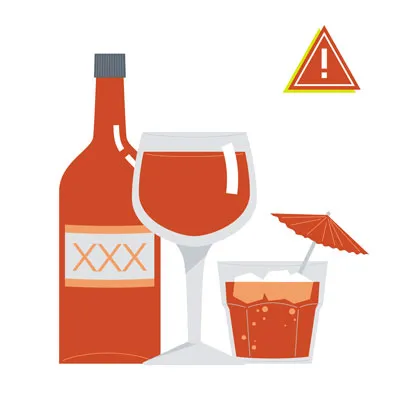 Alcohol
Alcohol
1. Alcohol
Due to their smaller body size and different metabolic rates, alcohol can have a much more severe and deadly effect on dogs than on humans. Even a small amount of alcohol can be highly dangerous. The smaller the dog, the greater the risk. Symptoms of alcohol poisoning in dogs mirror those in humans, including vomiting, breathing difficulties, disorientation, coma, and even death.
2. Fruit Seeds, Pits, and Cores
While the fleshy parts of some fruits are safe, their cores, seeds, and pits are often hazardous.
- Apple seeds and cores: Apple seeds contain cyanide. While a small amount might not be immediately dangerous, it’s best to remove the core and seeds entirely.
- Apricot, cherry, peach, and plum seeds/pits: These stone fruit pits also contain cyanide, which can inhibit red blood cells from carrying oxygen, leading to symptoms like vomiting, irregular and rapid heartbeat, seizures, coma, and death. Furthermore, the hard pits themselves pose a choking hazard and can cause gastrointestinal obstruction. For a deeper dive into fruits your dog should avoid, refer to our article on what fruits can my dog not eat.
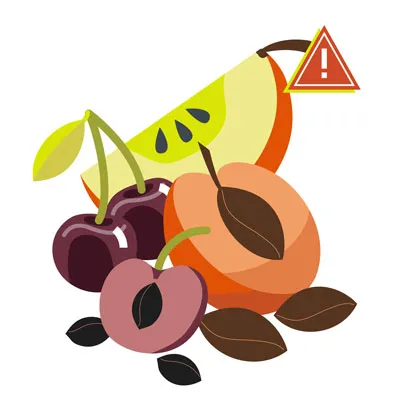 Apple, Apricot, Cherry, & Plum Seeds/Pits
Apple, Apricot, Cherry, & Plum Seeds/Pits
3. Avocado
Avocado is not a good choice for dogs. It contains persin, a fungicidal toxin. While the effects of persin on dogs are debated and direct myocardial damage has not been widely replicated in dogs as it has in other species, it can still cause gastrointestinal upset like vomiting and diarrhea. More significantly, an intact avocado pit poses a severe choking hazard and can obstruct the gastrointestinal tract, requiring emergency veterinary intervention. It’s safest to keep avocados away from your dog.
 Avocado
Avocado
4. Broccoli
Broccoli contains isothiocyanates, which can irritate a dog’s gastrointestinal tract and be harmful in very large doses. While small, occasional amounts of cooked broccoli might be tolerated by some dogs, there are many other safer and healthier vegetable options available. Additionally, broccoli stalks can be a choking hazard or cause an obstruction if not cut into very small pieces.
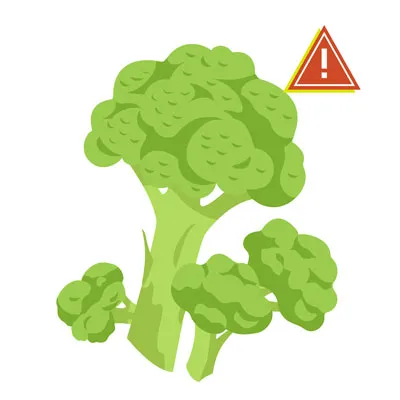 Broccoli
Broccoli
5. Caffeine and Coffee Grounds
Caffeine, found in coffee, tea, energy drinks, and some medications, contains methylxanthines. These stimulants can be highly toxic to dogs, leading to severe symptoms such as hyperactivity, vomiting, diarrhea, tremors, seizures, irregular heartbeat (arrhythmia), and difficulty breathing. In severe cases, caffeine toxicity can be fatal. Even coffee grounds, tea bags, or discarded coffee beans can contain enough caffeine to cause serious problems.
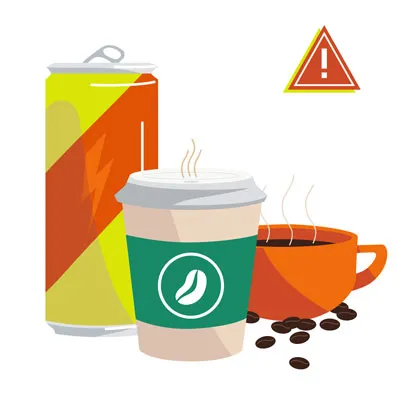 Caffeine & Coffee Grounds
Caffeine & Coffee Grounds
6. Fatty Meats, Skin, and Cooked Bones
Feeding dogs fatty cuts of meat, ham, or poultry skin (like chicken or turkey skin) is highly discouraged. The high-fat content in these items can trigger acute pancreatitis, a life-threatening inflammatory condition of the pancreas that can lead to severe complications.
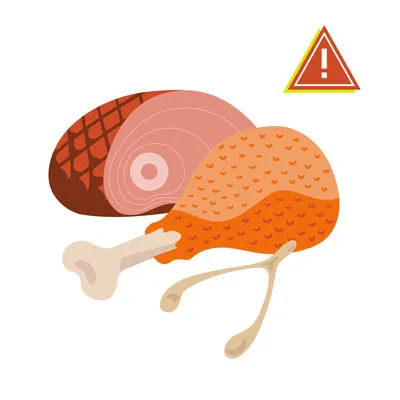 Chicken & Turkey Skin, Ham, & Other Fatty Cuts of Meat
Chicken & Turkey Skin, Ham, & Other Fatty Cuts of Meat
Cooked bones, especially from poultry or other brittle sources, should also be strictly avoided. Cooked bones can splinter easily, posing risks of choking, obstruction of the bowels, or internal damage to the stomach or intestines. Such damage can lead to perforations, resulting in a fatal abdominal infection. For dogs prone to digestive issues, specifically pancreatitis, understanding what food can a dog with pancreatitis eat is vital.
7. Chocolate
Chocolate is one of the most widely known toxic foods for dogs, especially during holidays when it’s commonly present in homes. It contains theobromine and caffeine, both methylxanthines that dogs cannot metabolize efficiently. The darker the chocolate, the higher its theobromine content and thus its toxicity. Even sugar-free chocolate can be dangerous if it contains xylitol. Symptoms of chocolate toxicity include hyperactivity, vomiting, diarrhea, pancreatitis, abnormal heart rhythm, and seizures. Any ingestion of chocolate, regardless of amount, warrants immediate contact with a veterinarian.
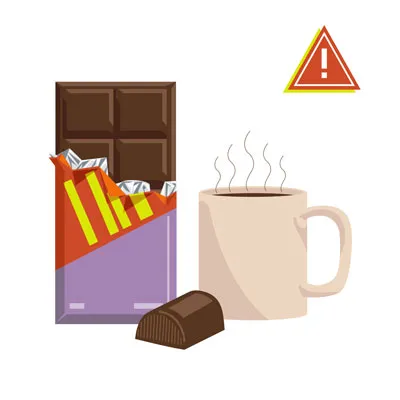 Chocolate
Chocolate
8. Grapes and Raisins
Grapes and raisins are notoriously dangerous for dogs, capable of causing acute kidney failure. The exact toxic substance is believed to be tartaric acid. Even a small number of grapes or raisins can wreak havoc on a dog’s kidneys. Symptoms of grape or raisin poisoning include vomiting, diarrhea, lethargy, loss of appetite, abdominal pain, increased thirst, and changes in urination (from increased to no urine output). If you suspect your dog has eaten grapes or raisins, seek emergency veterinary care immediately.
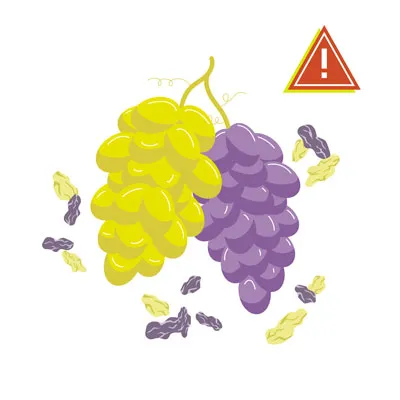 Grapes & Raisins
Grapes & Raisins
9. Nuts (Macadamia, Almonds, Pistachios)
Macadamia nuts are highly toxic to dogs, causing symptoms such as weakness, overheating, vomiting, tremors, and temporary paralysis of the hind legs. The exact mechanism of toxicity is still unknown, but even a small quantity (as few as six nuts for a small dog) can cause severe poisoning. Other nuts, while not necessarily toxic, can still be problematic. Almonds and pistachios, for example, are choking hazards and their high fat content can lead to gastrointestinal upset or pancreatitis. Always opt for plain, unsalted nuts if considering them as a rare treat, but generally, it’s safer to avoid them.
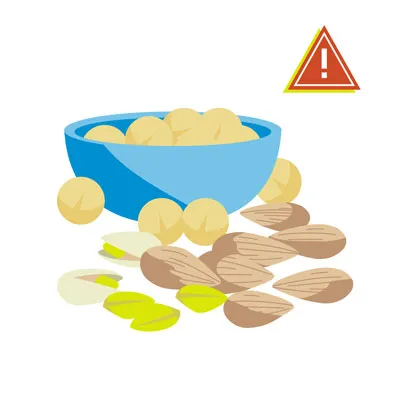 Macadamia Nuts, Almonds, & Pistachios
Macadamia Nuts, Almonds, & Pistachios
10. Milk and Dairy Products
The suitability of milk and dairy products for dogs varies. Many dogs are lactose intolerant, meaning they lack the enzyme lactase needed to digest lactose in milk. This can lead to gastrointestinal upset, including diarrhea and gas. While some dogs can tolerate small amounts, it’s generally safer to avoid giving them cow’s milk. Ice cream, due to its high sugar and fat content, is also bad for dogs. Cheese can be given in very small quantities as a treat, but opt for lower-fat varieties like mozzarella over high-fat options, and ensure your dog has no lactose intolerance.
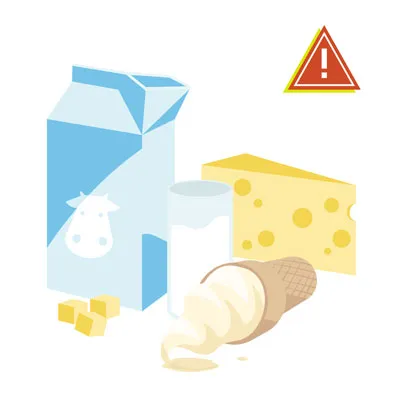 Milk & Dairy Products
Milk & Dairy Products
11. Mushrooms
It is generally best to avoid feeding any mushrooms to your dog, unless they are specifically cultivated, washed, white button mushrooms from a grocery store and given in small amounts. Wild mushrooms, even those that appear harmless, can contain a variety of toxins that may cause severe kidney and liver failure, gastrointestinal distress, neurological symptoms like hallucinations, or damage to red blood cells. Given the difficulty in identifying poisonous mushroom species, it’s always safer to choose a different treat for your dog.
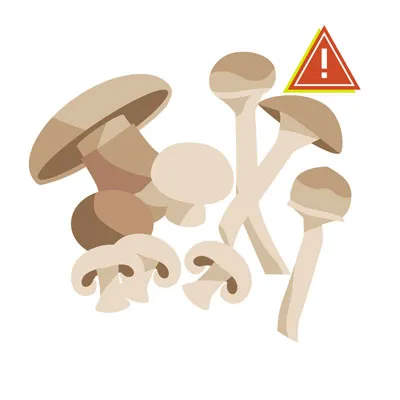 Mushrooms
Mushrooms
12. Nutmeg and Cinnamon
Nutmeg contains myristicin, a compound that can cause hallucinations, disorientation, rapid heart rate, high blood pressure, and severe vomiting in dogs. The effects are more pronounced in high doses or in smaller dogs. It is crucial to prevent dogs from ingesting any amount of nutmeg. Cinnamon is not considered toxic in small amounts, but large quantities, especially in powdered form, can irritate a dog’s mouth and respiratory tract if inhaled. It can also cause a drop in blood sugar, leading to serious health effects. Therefore, it’s best to avoid giving dogs foods heavily spiced with cinnamon or nutmeg.
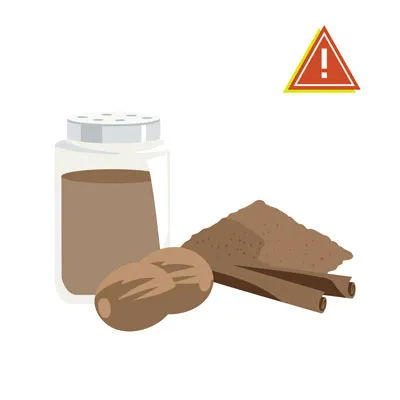 Nutmeg & Cinnamon
Nutmeg & Cinnamon
13. Onions, Garlic, Chives, and Leeks (Allium Family)
All members of the allium family, including onions, garlic, chives, and leeks, are highly toxic to dogs. These plants contain sulfoxides and disulfides, which can damage a dog’s red blood cells, leading to hemolytic anemia. Symptoms include lethargy, weakness, pale gums, elevated heart rate, and collapse. Onion and garlic powders are potent and often hidden in many processed human foods, including baby food, so always check labels carefully. Certain Japanese breeds, such as Akitas and Shiba Inus, are particularly sensitive, but these plants are dangerous to all dogs.
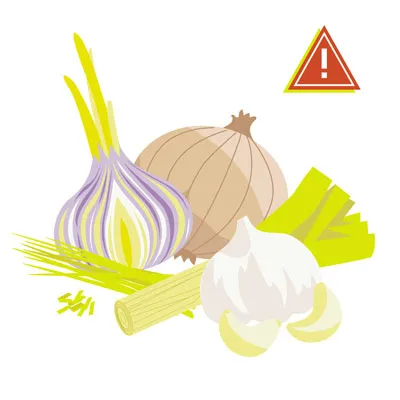 Onions, Garlic, Chives, & Leeks
Onions, Garlic, Chives, & Leeks
14. Salt
Excessive amounts of salt (sodium chloride) can disrupt the fluid balance in a dog’s body, leading to sodium ion poisoning. This can cause a range of serious symptoms including tremors, seizures, vomiting, diarrhea, and even coma. Foods high in salt, such as potato chips, pretzels, and certain processed snacks, as well as household items like rock salt or homemade play dough, should be kept far away from your dog. Always ensure your dog has access to plenty of fresh water to help prevent dehydration.
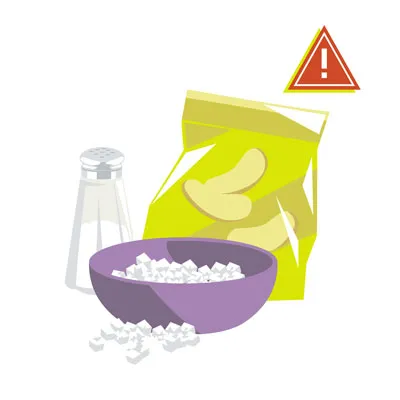 Salt
Salt
15. Spicy Food
Spicy foods containing capsaicin, often found in chilies and hot sauces, are very irritating to a dog’s digestive system. Ingesting spicy food can cause intense gastrointestinal upset, leading to vomiting, diarrhea, excessive thirst, and abdominal pain. In severe cases, it can even cause stomach ulcers. These painful reactions are not only distressing for your dog but can also lead to costly emergency veterinary visits. It’s best to keep your dog’s diet bland and free of any spicy ingredients.
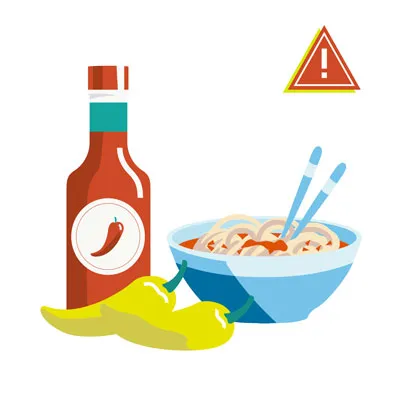 Spicy Food
Spicy Food
16. Sugar-Free Gum and Candy (Xylitol)
Xylitol is an artificial sweetener commonly found in sugar-free gums, candies, baked goods, toothpaste, and even some peanut butters. It is profoundly toxic to dogs. Even small amounts can cause a rapid and severe drop in blood sugar (hypoglycemia), leading to weakness, loss of coordination, seizures, and liver failure. Cases of xylitol poisoning are increasing, making it crucial for pet owners to meticulously check ingredient labels. The amount of xylitol in just five pieces of sugar-free gum has the potential to be fatal to a 65-pound dog.
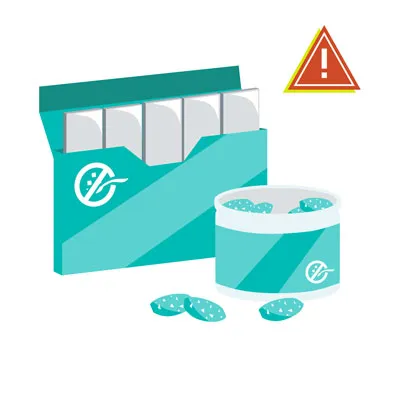 Sugar-Free Gum & Candy (Xylitol)
Sugar-Free Gum & Candy (Xylitol)
17. Tomatoes and Raw Potatoes
These nightshade vegetables present a “safe in some forms, unsafe in others” scenario.
- Tomatoes: A ripened red tomato is generally considered safe for dogs in moderation. However, the green parts of the tomato plant (stems, leaves) and unripe green tomatoes contain solanine, a glycoalkaloid that is toxic to dogs and can cause gastrointestinal upset, lethargy, and weakness.
- Potatoes: Cooked potatoes (baked or boiled, without additives) are generally safe in small amounts. However, raw potatoes, especially green ones or those with sprouts, also contain solanine and should be avoided. Potato skins can also be hard for dogs to digest.
18. Tobacco
Tobacco products, including cigarettes, cigars, chewing tobacco, and e-cigarette liquids, contain nicotine, which is highly toxic to dogs. Even discarded cigarette butts can contain enough residual nicotine to cause poisoning. Symptoms of nicotine toxicity include vomiting, diarrhea, rapid or labored breathing, agitation, abnormal heart rate, wobbliness, muscle weakness, high or low blood pressure, seizures, and tremors. In severe cases, it can lead to blue gums, coma, and be fatal. Immediate veterinary attention is critical if your dog ingests any tobacco product.
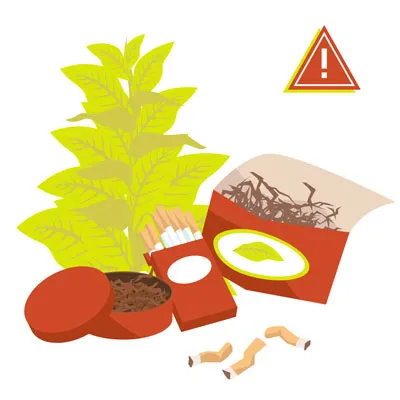 Tobacco
Tobacco
19. Yeast and Raw Dough
Raw yeast dough is extremely dangerous for dogs for two main reasons. First, the warm, moist environment of a dog’s stomach provides an ideal setting for the dough to rise and expand significantly. This expansion can cause severe bloating, intense pain, and potentially life-threatening conditions like gastric dilatation-volvulus (GDV), a twisting of the stomach that can be fatal without immediate medical intervention. Second, the fermenting yeast and sugar in raw dough produce alcohol. This fermentation can lead to alcohol toxicity, which, as previously mentioned, can be fatal and requires urgent veterinary care.
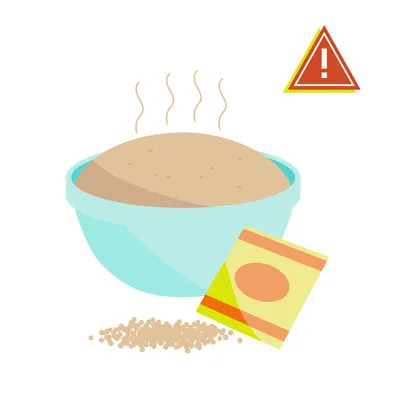 Yeast & Raw Dough
Yeast & Raw Dough
20. Raw Meat
Feeding raw or undercooked meat to your dog carries significant risks. Raw meat can harbor dangerous bacteria such as Salmonella and E. coli, which can cause severe gastrointestinal illness in dogs, just as they do in humans. These pathogens can also be shed in your dog’s feces, posing a risk to other pets and humans in the household. Additionally, raw meat often contains bones, which can splinter and cause choking, or internal injuries and obstructions in the digestive tract. Always ensure any meat given to your dog is thoroughly cooked and boneless.
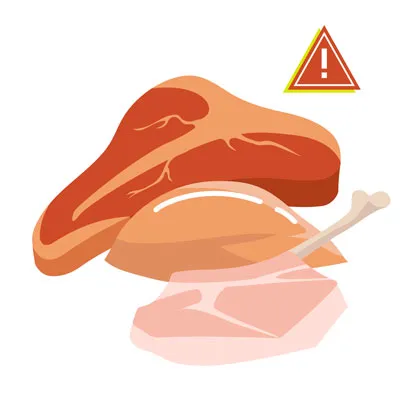 Raw Meat
Raw Meat
21. Rhubarb
Rhubarb, commonly used in desserts, is unsafe for dogs. Its leaves, and to a lesser extent the stalks, contain soluble calcium oxalate crystals. If ingested in sufficient quantities, these crystals can bind with calcium in the body, leading to a dangerous drop in blood calcium levels (hypocalcemia) and potentially severe kidney damage or renal failure. Symptoms may include tremors, weakness, excessive drooling, bloody urine, changes in thirst and urination, and vomiting.
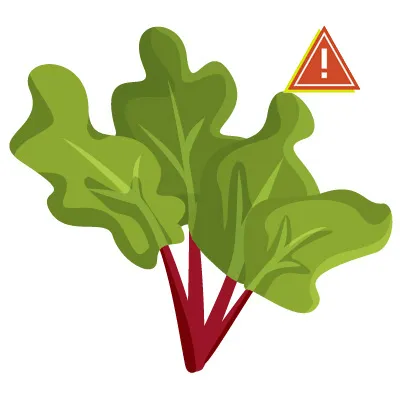 rhubarb
rhubarb
22. Star Fruit
Similar to rhubarb, star fruit also contains soluble calcium oxalate crystals. This tropical fruit should not be offered to dogs, as it carries the same risks of hypocalcemia and kidney problems if consumed in large enough amounts.
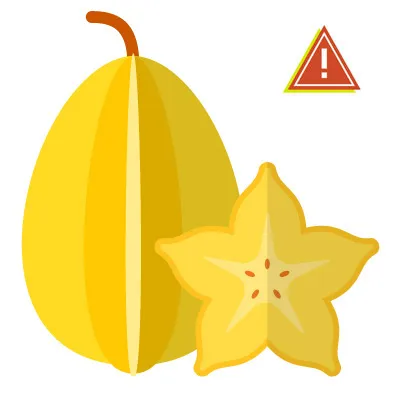 star fruit
star fruit
23. Flavored Water and Seltzer Water
It’s always best to give your dog fresh, clean, plain water. Flavored and seltzer waters can contain added ingredients that are unsafe for dogs, such as artificial sweeteners (like xylitol), high levels of sugar, or excessive salt. While plain seltzer water might not be immediately toxic in small amounts, the carbonation can cause gas and bloating, which can be uncomfortable or even dangerous for some dogs. Always stick to plain, unflavored water as the safest hydration option.
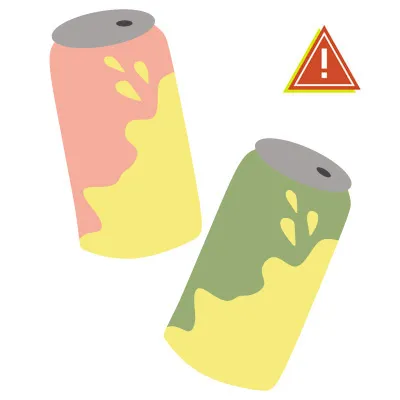 seltzer water
seltzer water
Safe Human Foods for Dogs
While the list of forbidden foods for dogs is extensive, there are also many safe human foods for dogs that can be offered as healthy and enjoyable treats in moderation. These options provide vitamins, minerals, and fiber without posing a risk.
1. Apples (Flesh Only), Oranges, and Bananas
- Apples: Always remove the core and seeds, as they contain cyanide. The crisp, fleshy part of an apple is a great source of fiber and vitamins for your dog.
- Oranges: Small amounts of peeled, seedless orange segments can be given. They are high in Vitamin C but also contain natural sugars, so moderation is key.
- Bananas: A potassium-rich treat, bananas (peeled) are safe in moderation. Their high sugar content means they should be given sparingly.
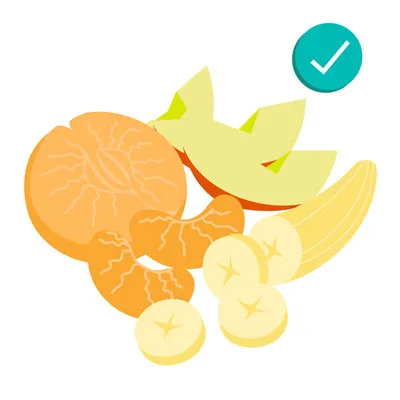 Apples, Oranges, & Bananas
Apples, Oranges, & Bananas
2. Blueberries and Blackberries
These antioxidant-rich berries are excellent treats for dogs. Blueberries, in particular, are packed with antioxidants, fiber, phytochemicals, and Vitamin C, all beneficial for your pup’s health. Blackberries offer similar nutritional benefits.
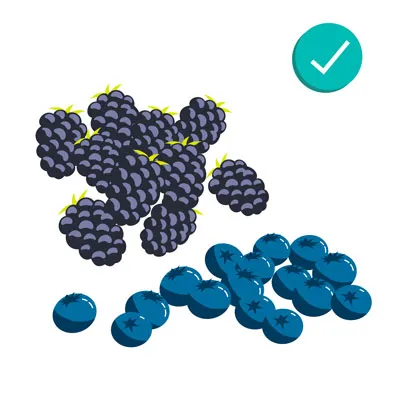 Blueberries & Blackberries
Blueberries & Blackberries
3. Cantaloupe, Mango, Peaches, Pears, Pineapples, and Watermelon
Many fruits are safe for dogs when prepared correctly:
- Cantaloupe: A good source of vitamins and water.
- Watermelon: Hydrating and low in calories, but always remove the rind and seeds (including pale seeds from “seedless” varieties).
- Mangoes, Peaches, Pears, and Pineapples: Safe in moderation, but always remove the skin, core, and especially the large pits or seeds, which are choking hazards and can contain cyanide.
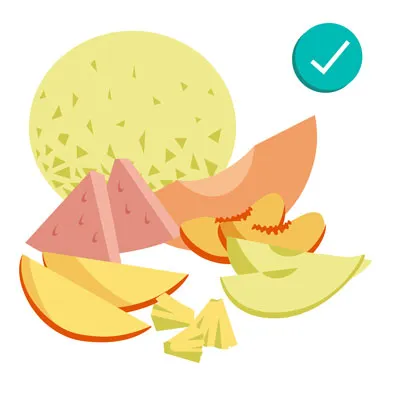 Cantaloupe, Mango, Peaches, Pears, Pineapples, & Watermelon
Cantaloupe, Mango, Peaches, Pears, Pineapples, & Watermelon
4. Carrots, Cucumber, and Celery
These “three C’s” are fantastic low-calorie, crunchy options, especially good for overweight dogs:
- Carrots: High in vitamins, great for dental health.
- Cucumbers: Mostly water, packed with vitamins and minerals, very low in carbs and fats.
- Celery: Offers a satisfying crunch and can help freshen breath.
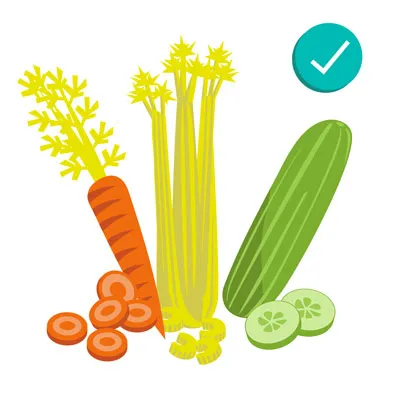 Carrots, Cucumber, and Celery
Carrots, Cucumber, and Celery
5. Cheese
While dairy can be tricky, small amounts of low-fat cheese can be an acceptable treat for dogs that aren’t lactose intolerant. Varieties like mozzarella are generally better than high-fat cheeses. Always consult your vet to ensure it’s suitable for your specific dog.
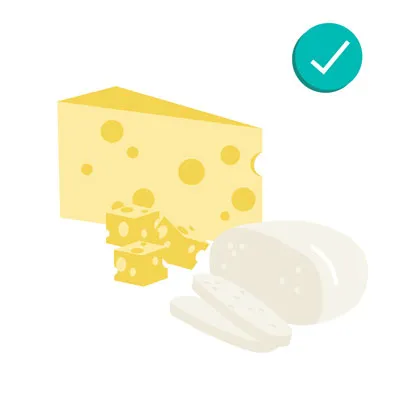 Cheese
Cheese
6. Eggs
Fully cooked eggs are a wonderful source of protein and can even help soothe an upset stomach. Scrambled or boiled eggs, plain and unseasoned, are a nutritious and tasty treat.
 Eggs
Eggs
7. Peanuts, Peanut Butter, and Cashews
- Peanuts and Cashews: Unsalted, unflavored peanuts and cashews are safe in small quantities, but their high-fat content means they should be given sparingly.
- Peanut Butter: A popular, high-protein treat. Crucially, always choose unsalted, natural peanut butter that contains no xylitol, as this artificial sweetener is highly toxic.
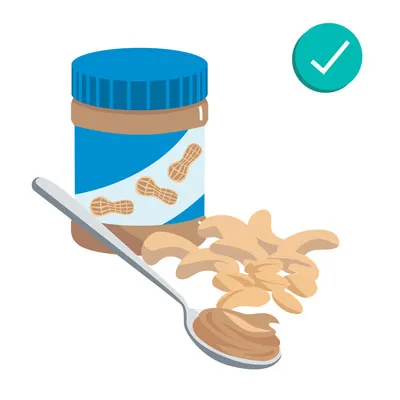 Peanuts, Peanut Butter, and Cashews
Peanuts, Peanut Butter, and Cashews
8. Popcorn and Corn
- Popcorn: Air-popped, unsalted, and unbuttered popcorn is generally safe. Ensure all kernels are fully popped to prevent choking hazards.
- Corn: Corn removed from the cob (plain, without butter, salt, or spices) is acceptable.
 Popcorn and Corn
Popcorn and Corn
9. Coconut and Honey
- Coconut: Small amounts of fresh coconut (without the fibrous shell), coconut milk, and coconut oil are generally fine and may offer benefits like lauric acid. However, some dogs might experience stomach upset, so introduce it cautiously. Avoid coconut water due to its high potassium content.
- Honey: In moderation, honey is safe and provides various vitamins and minerals.
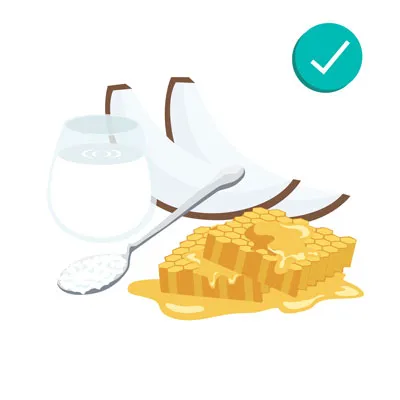 Coconut and Honey
Coconut and Honey
10. Shrimp and Fish
- Shrimp: Plain, fully cooked shrimp with the shell, head, tail, and legs removed makes a great treat. Avoid seasoned or buttered varieties.
- Fish: Plain, fully cooked, and boneless fish, particularly salmon and sardines, is safe and a good source of omega-3 fatty acids. Limit fish to no more than twice a week.
- Tuna: Plain, canned tuna (packed in water, not oil) is safe in moderation to avoid excessive mercury and salt intake.
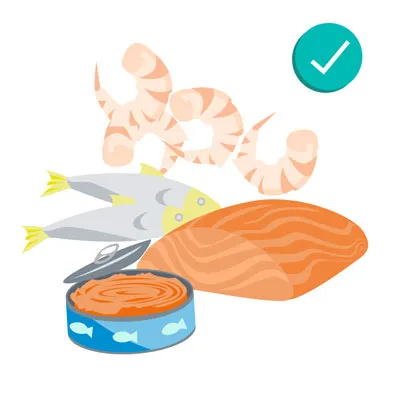 Shrimp and Fish
Shrimp and Fish
11. Turkey
Cooked, lean turkey meat (skinless, boneless, unseasoned) is a healthy and safe source of protein for dogs. Offer small, plain bites as a treat.
 Turkey
Turkey
12. Grains, Wheat, and Quinoa
Small amounts of cooked grains like wheat and quinoa are generally fine for dogs unless they have a specific allergy. Quinoa is a healthier option than many other common fillers.
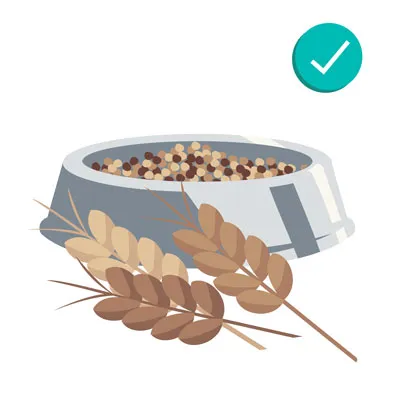 Grains, Wheat, and Quinoa
Grains, Wheat, and Quinoa
13. Green Beans
Green beans are a popular, healthy, and safe treat for many dogs. They can be served raw, steamed, or from a can (ensure no added salt or spices). Cut them into small pieces to prevent choking.
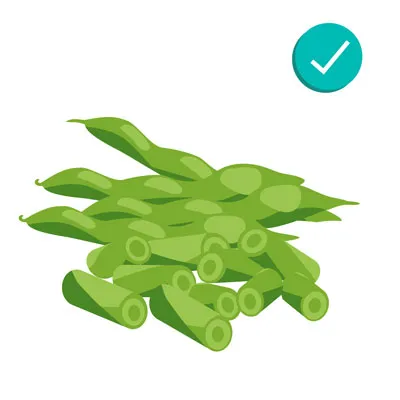 Green beans
Green beans
What Dogs Are Most at Risk if They Consume Toxic Foods?
While all dogs are vulnerable to toxic foods, certain characteristics can increase their risk and the severity of their reactions.
- Small Breeds vs. Large Breeds: Smaller dogs are generally more susceptible to toxic substances due to their lower body weight. A smaller amount of a harmful substance can quickly reach toxic concentrations in their system compared to a larger dog. This is especially true for items like chocolate or xylitol.
- Puppies: Young dogs have less developed digestive and immune systems. Their bodies are not as efficient at detoxifying harmful substances, putting them at greater risk from certain foods and even some raw food diets.
- Elderly Dogs: Older dogs may have compromised organ function or other underlying health conditions, making them more vulnerable to the adverse effects of toxic foods. Their bodies might struggle to process and eliminate toxins as effectively as younger, healthier dogs.
- Dogs with Pre-existing Conditions: Dogs suffering from chronic illnesses such as diabetes, kidney disease, liver disease, or gastrointestinal sensitivities are at a significantly higher risk. These conditions can worsen the effects of toxins or make their recovery more challenging. For example, a dog with kidney disease would be far more susceptible to grape toxicity. For dogs that are ill and have lost their appetite, understanding what to give a sick dog that won’t eat is crucial.
How to Prevent Dogs from Eating Toxic Foods
Preventing your dog from consuming toxic human foods is a critical aspect of responsible pet ownership. While accidents can happen, proactive measures significantly minimize the risks.
1. Store Foods Out of Reach
The most effective prevention is to ensure dangerous items are inaccessible to your dog. Keep all potentially toxic foods, ingredients, and prepared dishes on high shelves, in locked cabinets, or inside a secure pantry that your curious pup cannot open. Remember that dogs are clever and persistent, so assume they can reach or open anything left at their level.
2. Avoid Feeding Dogs from Your Plate
Resist the urge to feed your dog scraps directly from your plate or while you are cooking in the kitchen. This practice not only reinforces begging behavior but also increases the chances of accidentally giving them something harmful. It’s safest to reserve human foods that are safe for dogs for designated treat times, ensuring they are prepared appropriately and given away from the table.
3. Educate Family Members and Guests
Ensure everyone in your household, including children, and any guests, are aware of which foods are dangerous for your dog. Explain the risks and emphasize that no one should sneak food to your dog, no matter how much they beg. Clear communication helps create a consistent environment where everyone is mindful of your pet’s safety.
4. Be Careful During Holidays and Gatherings
Holidays and social gatherings often involve an abundance of food, busy kitchens, and distracted hosts, creating prime opportunities for accidental ingestion. Be extra vigilant during these times. Keep food covered and out of reach, assign a “dog watch” if necessary, and remind guests about your dog’s dietary restrictions. Having emergency contact information readily available for your veterinarian or pet poison control can be invaluable if precautions fail.
What to Do if Your Dog Eats Something Toxic
Despite your best efforts, accidents can happen. If you suspect your dog has ingested a toxic food, acting quickly and knowledgeably is paramount.
1. Recognize Symptoms of Food Toxicity
Familiarize yourself with common symptoms of food toxicity. These can vary depending on the substance ingested but often include:
- Gastrointestinal: Vomiting, diarrhea (which may be bloody), loss of appetite, excessive drooling.
- Neurological: Lethargy, weakness, tremors, seizures, disorientation, hyperactivity, uncoordinated movements.
- Cardiovascular/Respiratory: Rapid or labored breathing, abnormal heart rate, pale or blue gums.
- Other: Abdominal pain (dog may be hunched or reluctant to be touched), bloated or hard abdomen (potentially indicating severe issues like bloat).
2. Call Your Veterinarian or Poison Control Immediately
Do not wait for severe symptoms to appear. Timing is vital in cases of poisoning. Contact your veterinarian or a pet poison control center (like the ASPCA Animal Poison Control Center or Pet Poison Helpline) right away. They can provide expert guidance based on the specific toxin and your dog’s condition.
3. Be Ready with Important Information
When you call for help, be prepared to provide as much detail as possible:
- Type of food eaten: What exactly did your dog consume? If it was a packaged product, have the label ready.
- Amount consumed: Estimate how much your dog might have eaten.
- Time of ingestion: When did you first notice your dog eating it, or when do you estimate it happened?
- Your dog’s weight, age, and any existing medical conditions.
- Current symptoms: Describe everything you’ve observed.
4. Avoid Home Remedies Unless Advised by a Vet
Do not attempt to induce vomiting or administer any home remedies unless specifically instructed to do so by a veterinarian or poison control expert. Inducing vomiting can be harmful in certain situations (e.g., if the substance is corrosive or the dog is already vomiting or lethargic). The appropriate course of action depends entirely on the specific toxin involved.
Dog Care Story: Protecting Your Pup’s Health
Navigating the world of human foods and their potential impact on your dog’s health can feel overwhelming. From hidden household toxins to widely known dangerous foods, staying vigilant is key. Dogs, with their innate curiosity and sometimes indiscriminate tastes, rely on us to make safe choices for them. By understanding what human foods a dog cannot have and making informed decisions about their diet, you play a crucial role in safeguarding their well-being.
The good news is that there are numerous safe and healthy human foods that your dog can enjoy as treats. Explore our list of approved options, and find out which ones your furry friend loves! If you ever have any doubts about a particular food, or if your dog displays unusual symptoms after eating something new, always consult with your veterinarian. They are your best resource for personalized dietary advice.
At Dog Care Story, we are committed to providing you with the knowledge and tools to keep your dog healthy and happy. Unexpected veterinary emergencies, such as those caused by accidental ingestion of toxins, can be costly. Pet insurance can be a great way to help manage these unforeseen expenses. Explore our resources on dog insurance to learn more about customizing a plan for your pet’s unique needs. Additionally, our policyholders have access to a 24/7 Pet Helpline, allowing you to speak with a veterinary expert anytime you’re worried about something your pet may have eaten. Stay informed, stay vigilant, and enjoy a safe, healthy life with your cherished companion!
References
- “Top 10 dog poisons,” Hilary Parker (5/2023), WebMD, https://www.webmd.com/pets/dogs/top-10-dog-poisons
- “What happens if a dog eats chocolate?” (10/2023), Colorado State University, https://vetmedbiosci.colostate.edu/vth/animal-health/why-is-chocolate-bad-for-dogs/
- “Fruits and vegetables dogs can or can’t eat,” (3/2024), American Kennel Club, https://www.akc.org/expert-advice/nutrition/fruits-vegetables-dogs-can-and-cant-eat/
- “What to do if your dog drinks alcohol,” Jerry Klein (7/2023), American Kennel Club, https://www.akc.org/expert-advice/vets-corner/is-alcohol-dangerous-for-dogs/
- “Can dogs eat apples?” Hector Joy (12/2022), PetMD, https://www.petmd.com/dog/general-health/can-dogs-eat-apples
- “Can dogs eat plums?” Katie Koschalk (7/2023), Chewy, https://be.chewy.com/nutrition-pet-diet-tips-can-dogs-eat-plums/
- “Avocado (Persea spp) Toxicosis in Animals,” Cristine Hayes (9/2024), Merck Veterinary Manual, https://www.merckvetmanual.com/toxicology/food-hazards/avocado-persea-spp-toxicosis-in-animals
- “People foods to avoid feeding your pets,” (n.d.), ASPCA, https://www.aspca.org/pet-care/animal-poison-control/people-foods-avoid-feeding-your-pets
- “People foods dogs can and can’t eat,” (3/2024), American Kennel Club, https://www.akc.org/expert-advice/nutrition/human-foods-dogs-can-and-cant-eat/
- “Can dogs eat nuts?” Amanda Ardente (1/2023), PetMD, https://www.petmd.com/dog/nutrition/can-dogs-eat-nuts
- “Can dogs drink milk?” Sandra C. Mitchell (1/2024), PetMD, https://www.petmd.com/dog/nutrition/can-dogs-drink-milk
- “Can dogs have nutmeg?” Barri J. Morrison (11/2023), PetMD, https://www.petmd.com/nutmeg-safe-dogs
- “Onion, garlic, chive, and leek poisoning in dogs,” Renee Schmid et al. (2024), VCA Animal Hospitals, https://vcahospitals.com/know-your-pet/onion-garlic-chive-and-leek-toxicity-in-dogs
- “Can dogs eat tomatoes?” Anna Burke (10/2024), American Kennel Club, https://www.akc.org/expert-advice/nutrition/can-dogs-eat-tomatoes/
- “Can dogs eat potatoes?” Katherine Ripley (11/2023), American Kennel Club, https://www.akc.org/expert-advice/nutrition/can-dogs-eat-potatoes/
- “What to do if your dog eats a cigarette butt,” (6/2023), American Kennel Club, https://www.akc.org/expert-advice/health/dog-ate-cigarette-butt/
- “Dough & dogs: Why it’s bad and what you can do,” Lisa Goldstein (7/2024), Preventive Vet, https://www.preventivevet.com/dogs/dough-is-toxic-to-dogs
- “Rhubarb,” (n.d.), Pet Poison Helpline, https://www.petpoisonhelpline.com/poison/rhubarb/
- “Can dogs drink carbonated water?” Heather Logue (n.d.), Rover, https://www.rover.com/blog/can-dogs-drink-carbonated-water/
- “What fruits can dogs eat?” Ellen Malmanger (2/2024), PetMD, https://www.petmd.com/dog/nutrition/what-fruits-can-dogs-eat
- “Can dogs have green beans?” Anna Burke (8/2022), American Kennel Club, https://www.akc.org/expert-advice/nutrition/can-dogs-have-green-beans/
- “About pet food safety,” (4/2024), CDC, https://www.cdc.gov/healthy-pets/about/pet-food-safety.html
